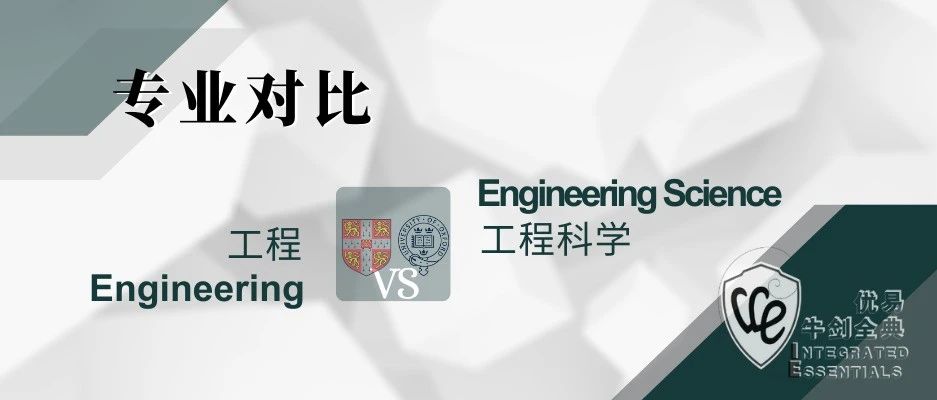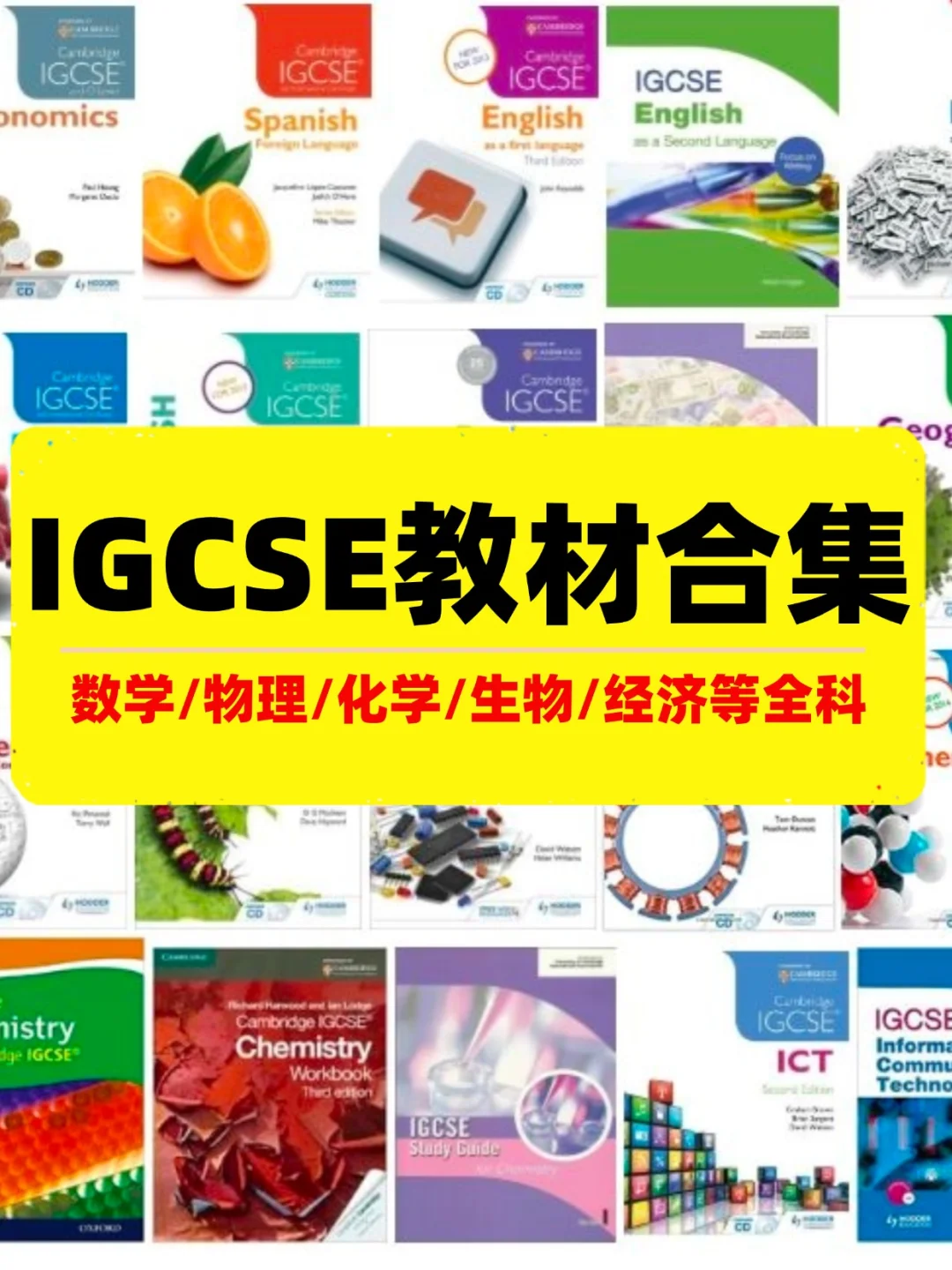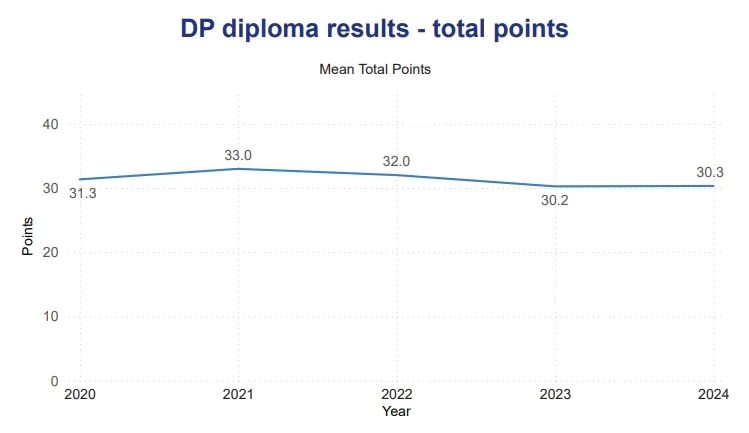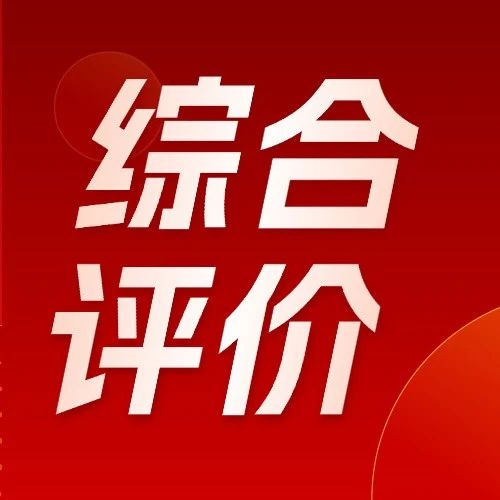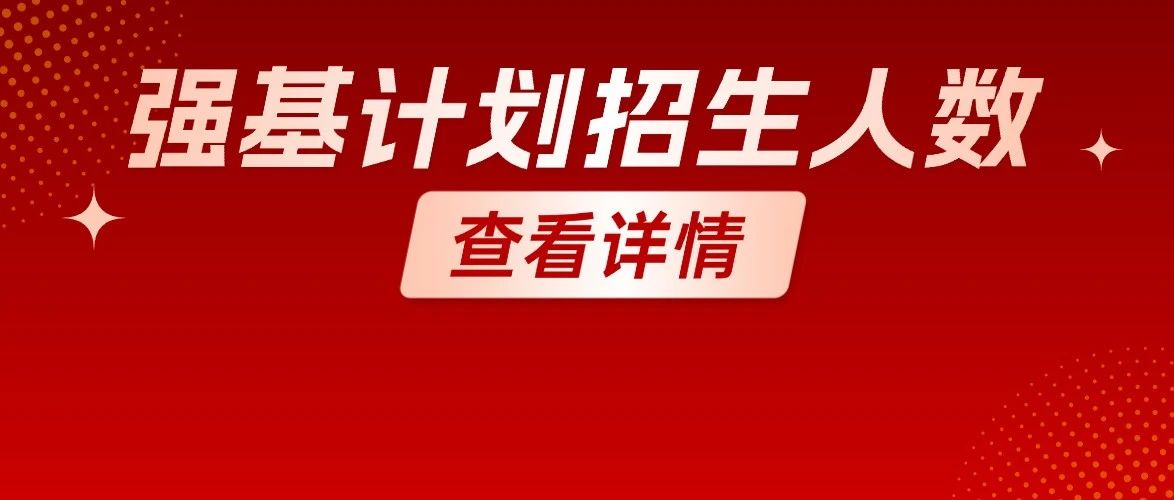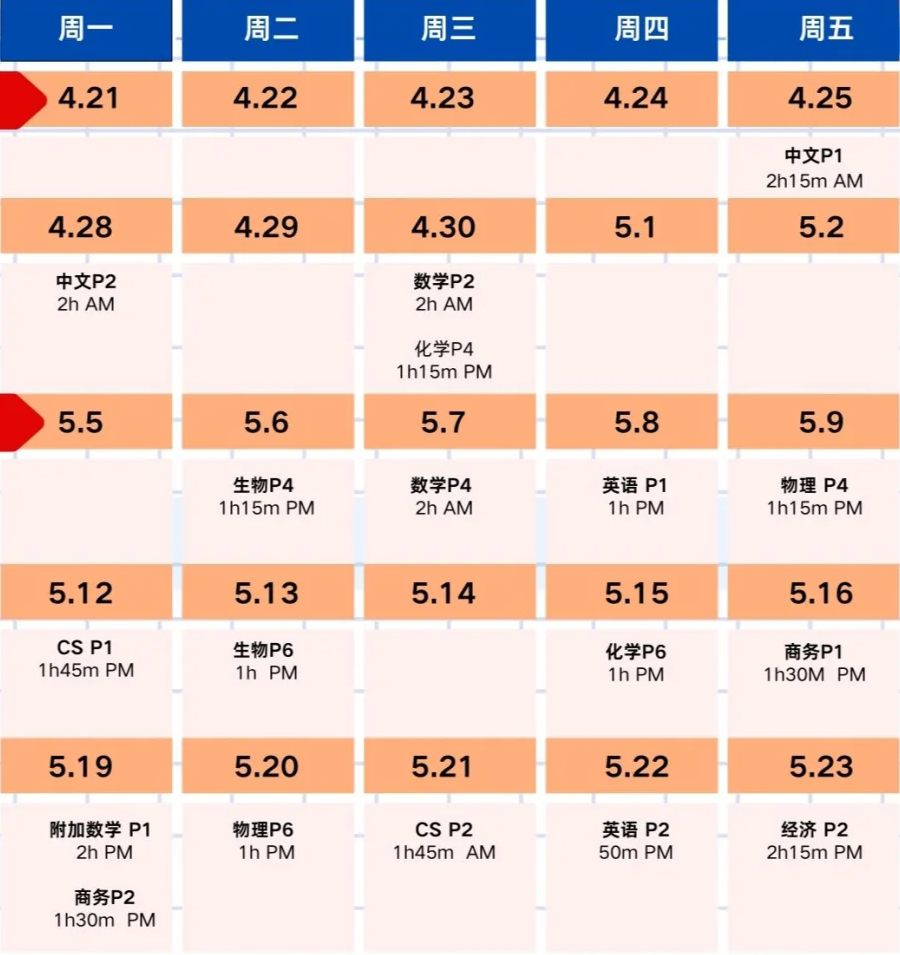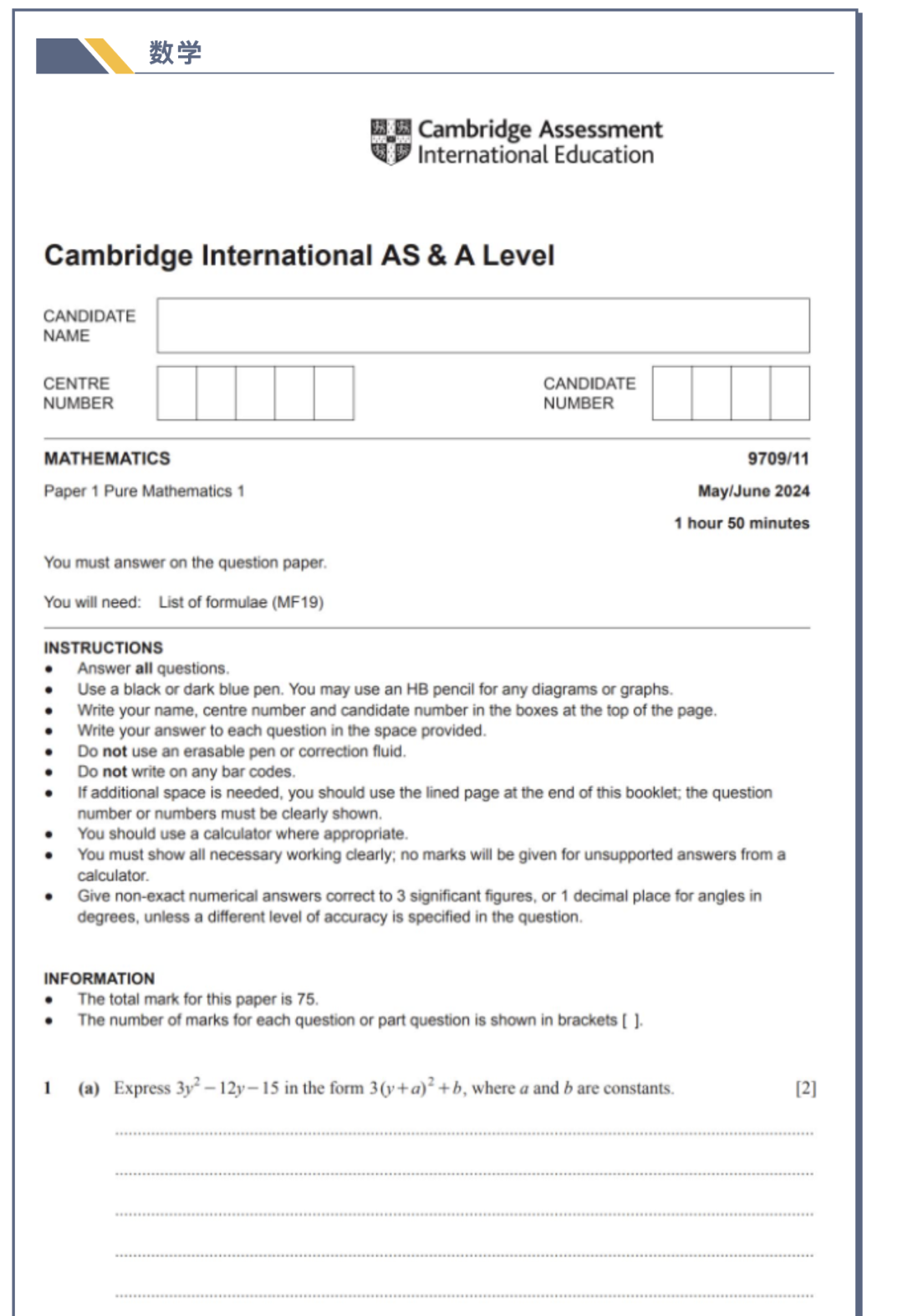文章导读
PS个人文书的基本写作思维
PS个人文书的常规要点
PS个人文书的素材与应用
(以牛剑数学/计算机类专业申请文书写作为例)
>>>>>> 牛剑学长回顾申请季
理性而全面的决策是对自己最大的负责。如果文书交给别人写,自己不参与,就不会理解留学这一路上的风景与坎坷,不会理解学校和专业的发展机会,如井底之蛙,埋头于做题考分,视野封闭。不会认识到自己的逻辑、写作、还有时间管理上的严重问题,虽然是被催着做拓展阅读,被压迫着和导师英文交流解题思路,被提醒着各种deadline,但这一路“折腾”的过程,对我的成长来说,本身就是一笔巨大的财富。
01
个人文书的基本写作思维
动笔写任何文字,都是你思想的流露,都是你大脑思维的外化表现,不可小觑。个人文书之难,难在写作对象是你自己,难在不只是语言表达。写个人文书,写的不只是你的成就,更是你的成长;写的不只是你的知识,更是你的见识。
希望你能接受这个观点:无论怎样强调“写作思维”都不为过!写作的三要素在个人文书里也是高度适用的。
立意——中心思想
个人文书本质上就是自我推销文,目的是 sell yourself 。关于文书的立意请牢记三点:第一、阐述一种观点(我就是适合的candidate),第二、说明这个与众不同的人(我的优点和专业潜质很突出),第三、讲个故事让审阅官轻松获知前面两点。
材料—— 素材
材料也就是说明你这个person的素材。素材是用来支撑观点的,所以要典型且真实。而“典型”并非挖空心思地编造,以求标新立异。同样的事件同样的学习经历也可以梳理出你个人的典型,后文详述。
表达——结构和方式风格
书面表达的关键点就在结构了,谋篇布局要清晰。建议采用并列式或层进式,段落分割建议不超过5段,首尾呼应,主次详略,段落之间注意起承转合,处理好衔接关系,给阅读者顺畅自然的感觉,彻底去除模板文的嫌疑。关于方式风格,在此不赘述,请一定老老实实讲话,statement就是陈述!抛弃玩弄字眼堆砌辞藻的炫耀思想,哪怕你的确腹有诗书才华横溢,也别尝试幽默调侃欲博得阅读者欢心,因为你无法保证自己能准确get到阅读者的幽默点。
02
个人文书的常规要点
在学术准备的路途上身经百战的你,如今通过填写UCAS申请信息,可以冷静地总结一下自己了,写个人文书正是这样一个绝好的机会。以下这一系列无比正确的“废话集”,也请收好:
仅此一份
英本申请,统一使用UCAS平台系统,可以申请5所大学和专业,但个人文书只需提交一份。
篇幅受限
个人文书篇幅限制4000个英文字符以内(约400-600词,含空格约47行)。注意UCAS申请表内不接受斜体、粗体或下划线等格式。建议用WORD写,复制粘贴到UCAS栏目框,检查篇幅量和单词断行等细节。
通识性
建议放弃同时申请两个毫无关联性的专业,个人文书中不要提及你申请的学校名称,不提及任何政治立场。
态度诚恳
虽为 “推销自己” ,但也不要表现得自命不凡。不要通篇都用I开头的句子展开描述。
目的明确
不要重复UCAS申请表格里已有的常规信息。
内容真实
不要夸张甚至虚假编撰,也别指望套用模板范文甚至抄袭。
多次修改
向合适的对象公开你的文书并征求反馈意见,调整素材或逻辑结构,同时,别让拼写和语法错误毁了你的文书。
03
个人文书的素材与应用
数学/计算机专业PS如何写?
1. 如何获取素材
根据个人的思维习惯和时间管理能力,以下三种方式可以帮你突破“万事开头难”这个万年梗:
1- 按照UCAS的建议准备个人文书素材,附上UCAS的worksheet,帮你梳理一下思路。英文问卷,涉及到你对专业选择的原因,你个人的特殊技能与经历,你此前的学习与课程专业的相关性,能证明你对专业热情的活动,个人技能与成就,兴趣爱好工作经历未来打算等等。
PS-Worksheet
2- 按照以下几个方面列清单:你对数学/计算机专业的热情表现在哪里?你对学科专业的了解有多深?你的学科专业潜力在哪里?你为数学/计算机专业付出的努力有哪些?然后对照清单问题,仔细去思考你做过的哪些事情可以很好地表现你的优秀品质,一一作答。
3- 以数学/计算机专业为中心,收集所有你能想到的关键词,用树状的结构画思维导图,帮助自己收集并整理素材。有些同学很擅长用思维导图的方式思考问题甚至解决问题,那么思维导图也一种不错的整理素材的方式。
无论是在写PS的过程中,还是在你的整个申请期,时时不忘对自己进行灵魂的拷问:你真的喜欢数学专业吗?你确定自己不是因为参加了几项数学竞赛拿了奖而选择了数学?你了解过牛剑的计算机专业到底学些什么课程吗?你准备此生与那些代码为伴,而不仅仅是为了得到那份令人艳羡的offer? 当这些问题真实地投射进你的脑海,你便有了无穷的动力去搜寻答案,有些答案已经在,你只需收集起来,而有些答案可能正是你后面需要弥补的,这也正是你逐步完善PS的原因所在。
——UCAS建议——
Here are some ideas to help you get started:
● Look at course descriptions and identify the qualities, skills, and experience it requires – you can use these to help you decide what to write about.
● Tell the reader why you’re applying – include your ambitions, as well as what interests you about the subject, the course provider, and higher education.
● Think about what makes you suitable – this could be relevant experience, skills, or achievements you’ve gained from education, work, or other activities.
● Include any clubs or societies you belong to – sporting, creative, or musical.
● Mention any relevant employment experience or volunteering you’ve done, such as vInspired Awards, Step Together, or Project Trust.
● If you’ve developed skills through Duke of Edinburgh, ASDAN, National Citizen Service, the Crest Awards scheme, or young enterprise, tell them.
● If you took part in a higher education taster course, placement, or summer school, or something similar, include it.
2. 如何归纳整理素材?
当所有要素亮点汇总聚集时,反倒发现了一张令人疲倦的“网红脸”,是不是?于是,怎么才能呈现一个outstanding的个体呢?果断取舍吧。
体察——体察你的梦校对候选人的偏好。做足功课,牛剑官网明确发布Who are we looking for? 另外,University prospectuses也是必要关注的,仔细研读你申请的专业,分析专业课程描述,同时比照自己是否符合挑选标准selection criteria,然后圈出相关的关键词和关键句,这些便是你个人文书中需要重点突出的部分,同时也为你积攒了文书表达所需要的词汇。
——剑桥关于PS的建议——
At Cambridge, all admissions decisions are based solely on academic criteria (ability and potential). Therefore, in your personal statement, we’d like you to:
●explain your reasons for wanting to study the subject at university
●demonstrate enthusiasm for and commitment to your chosen course
● express any particular interests within the field
● outline how you’ve pursued your subject interest in your own time
This information is often used as a basis for discussion at interview.
——牛津关于PS的建议——
Tutors at Oxford are only interested in your academic ability and potential. They want to see that you are truly committed to the subject or subjects you want to study at university but it’s not enough just to say that you have a passion for something: you need to show tutors how you have engaged with your subject, above and beyond whatever you have studied at school or college. This can include any relevant extra-curricular activities.
Try to avoid writing your personal statement as though you are ticking things off a list. There is no checklist of required achievements, and tutors will not just scan what you have written to look for key words or phrases. Tutors will read your personal statement to try to understand what has motivated you to apply for their course. It’s a good idea to evaluate your experiences, to show what you have learned from them and how they have helped develop your understanding of your subject.
牛津 | What are tutors looking for?
数学专业 UCAS code: G100
Tutors are looking for a candidate’s potential to succeed on the course. We recommend that candidates challenge themselves with mathematics beyond their curriculum, question their own understanding, and take advantage of any available extension material. Ultimately, we are most interested in a candidate’s potential to think imaginatively, deeply and in a structured manner about the patterns of mathematics.
数学和计算机科学 UCAS code: GG14
The most important qualities we are looking for are strong mathematical ability, the capability to think and work independently, the capacity to absorb and use new ideas, and a great deal of enthusiasm. We use this set of criteria and the result of the Mathematics Admissions Test (MAT) to decide whom to invite for interview. At the interview we will explore how you tackle unfamiliar problems and new ideas. We are more interested in how you approach problem-solving than whether you can get straight to a solution. We do not require any previous formal qualification in computing, but we do expect you to demonstrate a real interest in the subject.
数学与哲学 UCAS code: GV15
During the interview for philosophy you will be given the opportunity to show a critical and analytical approach to abstract questions and the ability to defend a viewpoint by reasoned argument. In mathematics you may find yourself asked to look at problems of a type that you have never seen before. Don’t worry, we will help you! We want to see if you can respond to suggestions as to how to tackle new things, rather than find out simply what you have been taught.
数学与统计 UCAS code: GG13
Tutors are looking for a candidate’s potential to succeed on the course. We recommend that candidates challenge themselves with Mathematics beyond their curriculum, question their own understanding, and take advantage of any available extension material. Ultimately, we are most interested in a candidate’s potential to think imaginatively, deeply and in a structured manner about the patterns of mathematics.
计算机科学 UCAS code: G400
We look for proven mathematical talent, the ability to think and work independently, the capacity to absorb and use new ideas, and enthusiasm. We use these criteria alongside the Mathematics Admissions Test (MAT) results to decide whom to interview.
At interview, we explore how you tackle unfamiliar problems and respond to new ideas; we are more interested in how you approach problem-solving than the solution. We don’t require any previous formal qualification in computing, but we do expect a real interest in the subject.
计算机科学与哲学 UCAS code: IV15
For Computer Science: strong mathematical aptitude, the ability to think and work independently, the capacity to absorb and use new ideas, and enthusiasm. For Philosophy: a critical and analytical approach to abstract questions, the ability to defend a viewpoint by reasoned argument, and a desire to delve deeper into the way we think about things. You do not need to have previously studied either subject.
3. 利用素材,开始写作—— MEET牛剑
M Motivated——
生活背景经历与拓展阅读体现出你的申请动机。审阅官希望在你的文书中找到你的动机来源和你的观点想法。不要将推荐书单走马观花全部scan一遍,书看了却无感,是浪费时间精力。阅读是极好的探索学科的方式,阅读需要你带着批判的思想对待作者提出的结论、假设等。当你真正开始“探索”你的学科专业时,你一定会迷上她。你会在阅读的书中感受到她的美,你会痴迷在推荐的网站上寻找她的神奇,你会如痴如醉地捧读推荐的journals……于是会冒出很多why和很多what if ,这些就是你的动机以及动机催生的观点想法,写下来吧。
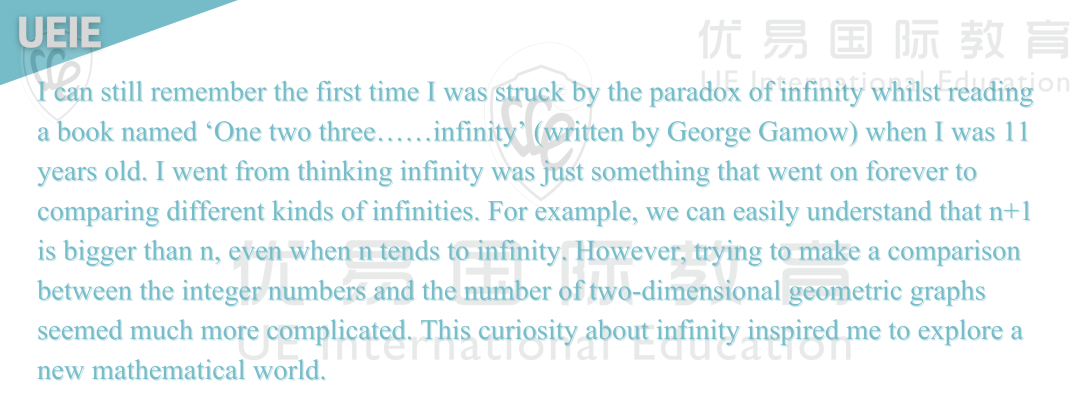
【牛津数学offer holder】
▲既是讲故事式的开头,又是兴趣的萌发,同时也表达了拓展阅读的体验与收获。
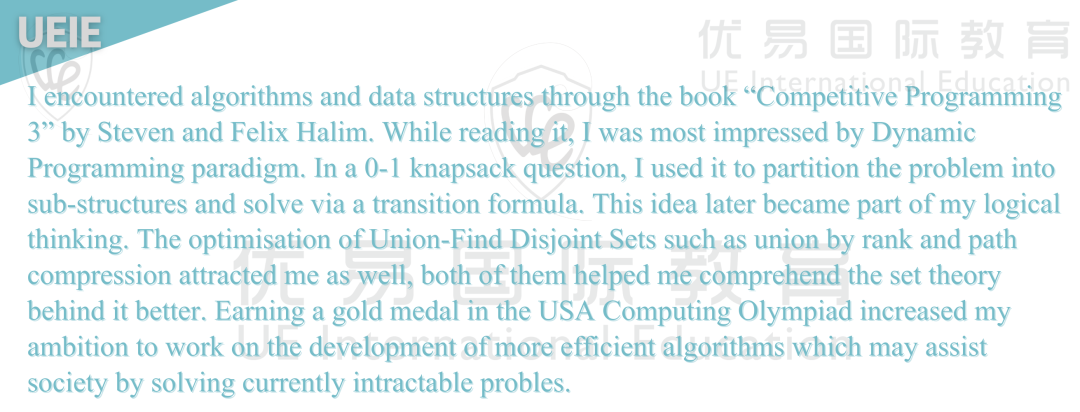
【剑桥计算机offer holder】
▲在个人活动经历中很自然地提到读过的书,阅读发展了思维,从阅读中领悟到了知识,也帮助解决了一些实际问题。从而也说明了自己竞赛活动成绩突出的背后原因。
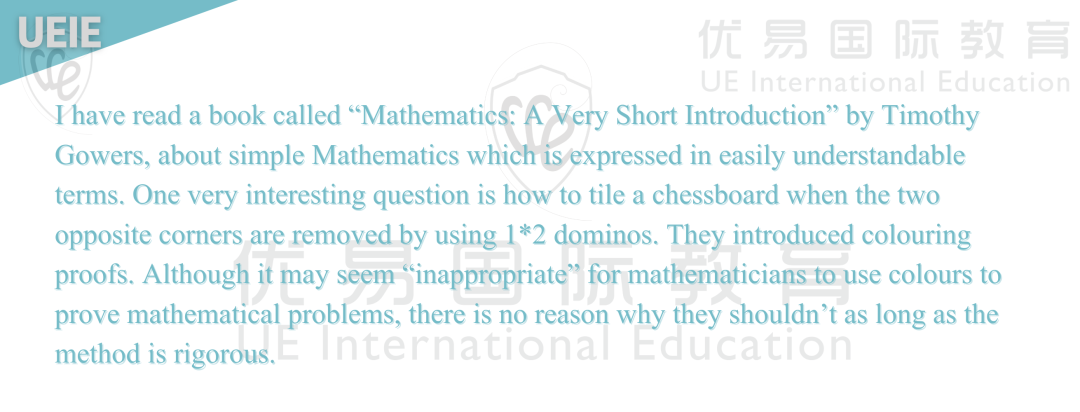
【帝国理工数学与数学计算offer holder】
▲阅读经历虽不算高深,但也质朴真实,表达了阅读带给自己的体验。
Super-curriculum Suggestion 超学科建议
这里有官方推荐的Reading lists,也有一些轻阅读资源,如杂志、博客、短论文等等,还有播客、媒体网站、APP等。
超学科建议Super-curriculum
E Enthusiastic——
你的竞赛活动经历表达了你对申请专业的热情。仅仅说你对专业课程有passion是远远不够的,必须表达出你是如何钻研其中,无论课内课外。告诉审阅官你是出于热爱而去参加了竞赛活动,并且在准备比赛和筹备科研活动的过程中收获了成长进步,从而侧面说明你在学科专业里的个人潜质。重点着墨在此过程中的收获,比如你遇到的困难是如何解决的,如何用已知解决了未知,如何将竞赛和活动联系到实际,并应用到生活中,解决现实中的疑难……这样的兴趣与热情,没有人会怀疑。
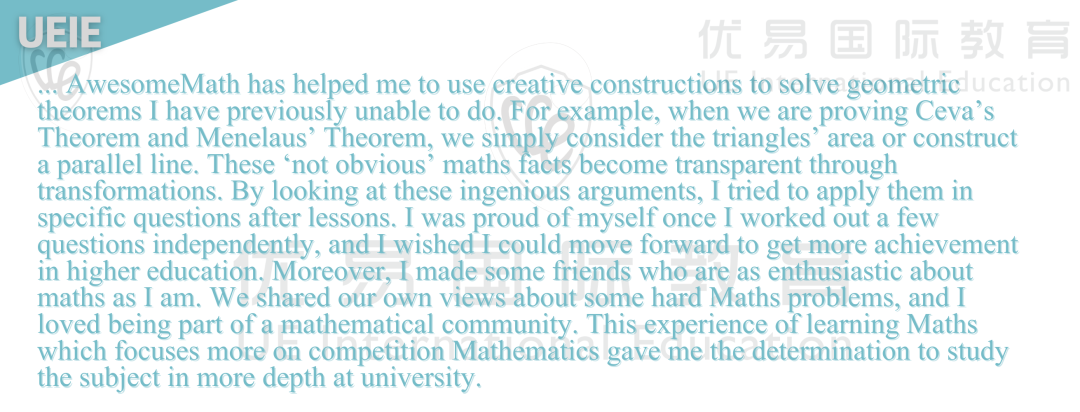
【剑桥数学offer holder】
▲详述自己在学术活动经历中的感受和观点,既说明了个人对学科知识的钻研过程。作为PS的收尾段落,重申了自己对学科的热情。
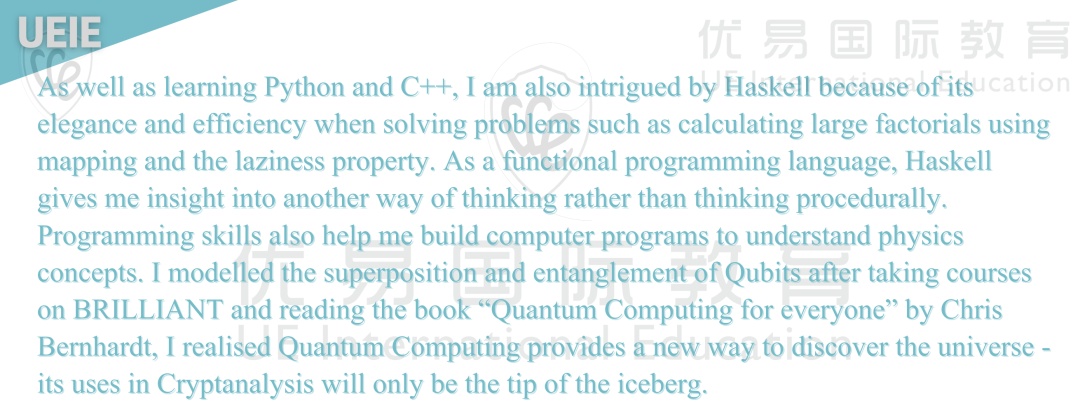
【剑桥计算机offer holder】
▲广泛涉猎,主动拓展,将自己的优势学科物理与申请专业计算机巧妙结合。没有对计算机的真爱,也不会痴迷Haskell编程语言,并进行跨学科探究了。
E Engaged——
有了热情和潜质的基础,努力勤奋就为你的脱颖而出插上了翅膀。你的学术成就帮助审阅官评估你为此付出的努力程度。在展示你的成绩时,重点描述你是如何孜孜以求的,尤其是数学和计算机专业,未来对你的时间精力的考验也不小,没有勤奋钻研的精神品质,后面的学业将难以为继。
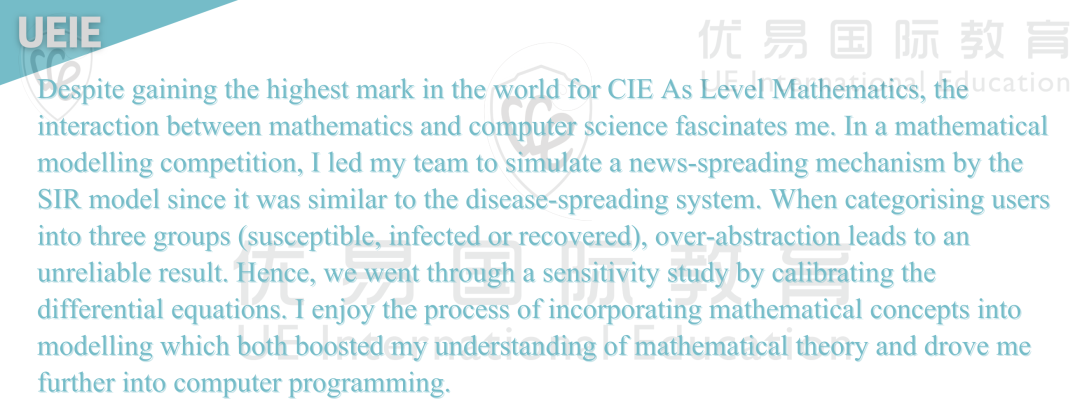
【剑桥计算机offer holder】
▲直接阐述优秀的学术背景与实力,但是仍然表达自己的勤奋态度:我带领团队通过SIR模型来模拟新闻传播机制,通过校准微分方程式进行了敏感性研究。我喜欢将数学概念纳入建模的过程,这不仅增进了我对数学理论的理解,而且驱使我进一步深钻计算机编程。
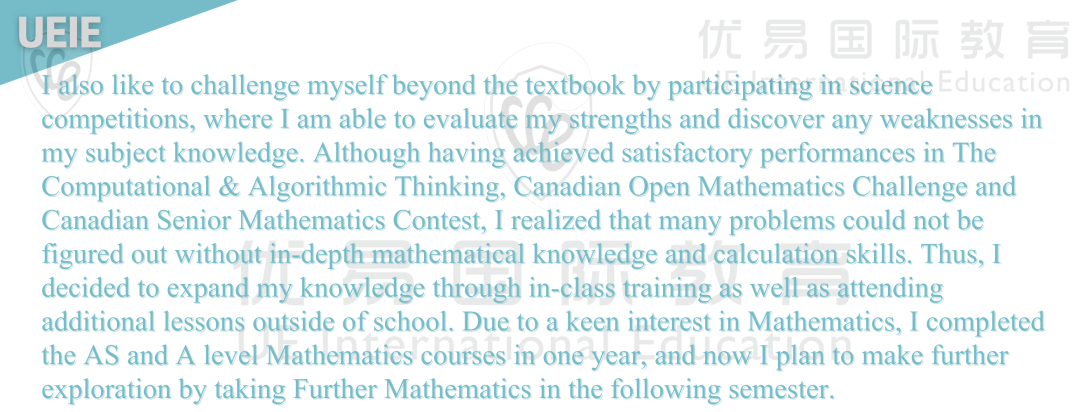
【帝国理工数学与数学计算offer holder】
▲表达自己的勤奋程度:由于对数学的浓厚兴趣,我在一年内完成了AS和A level数学课程,为了进一步探索,并计划在下学期学习进阶数学。
T Telling a story——
用顺畅的逻辑组织好诸多的素材,让这些典型素材之间产生关联。有发展主线的故事更能将观点讲述清楚,比如,你可能参加了多项竞赛,但获奖情况不太乐观,同时你也参与了相关学术活动,体验很深,那么你可以尝试这样写:从最初的兴趣萌发,到其间努力探索遭遇打击,到偶遇某个契机豁然开朗,最后拔得头筹的历程。此外,生活处处是科学,讲出你在生活中与科学的故事,强调一个真实而独特的你自己。
巧妙结合时事热点,谈出你的关注点和为此做的深入探索经历,可以为苦于自己经历背景太平淡的同学打开文书思路。在2020这个特殊年,除了与病毒相关的医学和生物领域,与之关联的专业学科其实无比丰富,在这个万物互联的世界,只要你对某个领域要兴趣,信息和素材俯拾皆是。结合数学统计或计算机数据软件开发等学科知识,联系你个人的思考探究,讲个故事,便足以demonstrate你的专业热情与思维潜质了。说明一下,这不是套路,只是建议,因为一个有逻辑的故事更容易留住读者的注意力。
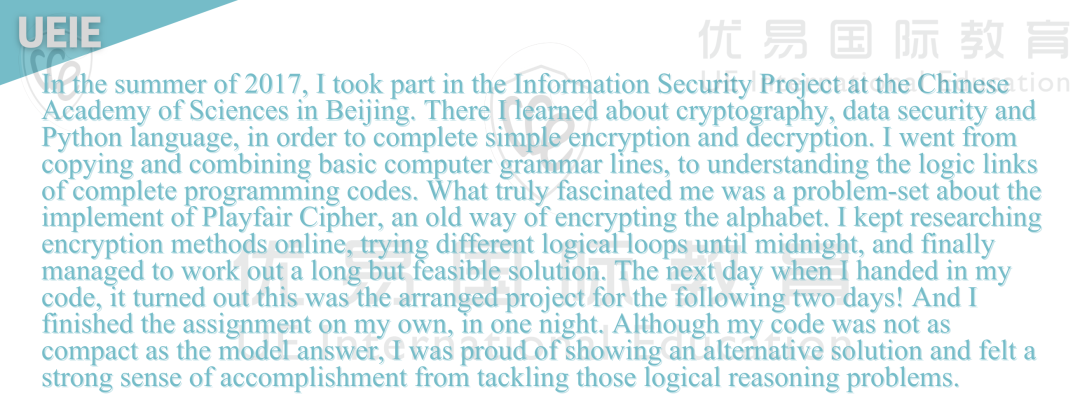
【牛津数学与统计offer holder】
▲ 流畅的故事,读来很轻松,毫无压迫感。
牛津说PS —— 五要五不要
DO:
● DO apply for a course you really want to study.
● DO be yourself: tell the truth about your interests.
● DO sell yourself: this is not the time for modesty.
● DO re-read your personal statement before an interview – the tutors may ask you to talk about things you've mentioned
● DO read the UCAS guidance on personal statements.
DON'T:
● DON’T be tempted to make anything up, as you might be asked about it at interview.
● DON’T copy anyone else’s personal statement. UCAS uses plagiarism detection software.
● DON'T list qualifications like your GCSE grades or anything else that's covered elsewhere on the application.
● DON’T just list your other achievements: you need to evaluate them.
● DON'T feel the need to be dramatic in order to be memorable
五要
● 一定要申请你真正想学的专业
● 一定要做你自己:说出你的兴趣所在
● 一定要推销自己:此刻不是谦虚的时候
● 一定要重读PS:在面试前重新阅读你的个人文书,因为导师会要求你谈谈文书中提到的事情
● 一定要阅读UCAS指南
五不要
● 不要尝试编造,因为你可能会在面试中被问到
● 不要抄袭文书,UCAS会使用抄袭检测软件
● 不要在你的申请表上列出你的GCSE成绩或其它在申请表中已经有的信息
● 不要只是列举你的其它成绩,你需要评估它们
● 不必为了被记住而夸大或戏剧化
——CUSU'S GUIDE——
最后,看看来自CUSU剑桥学生会的通用版个人文书写作建议吧。





